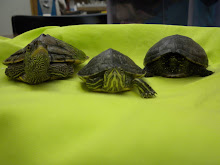We were intrigued by the premise of this book, and had to order it:
"In the future, in a world baked dry by the harsh sun, there are those who live inside the wall and those, like sixteen-year-old midwife Gaia Stone, who live outside. Gaia has always believed it is her duty, with her mother, to hand over a small quota of babies to the Enclave. But when Gaia's mother and father are arrested by the very people they so dutifully serve, Gaia is forced to question everything she has been taught to believe. Gaia's choice is now simple: enter the world of the Enclave to rescue her parents, or die trying."In some ways, the book is very satisfying. Gaia is a stong character with realistic emotions, brave but fallible. The plot works in that things don't always go according to plan, and of course the whole premise is something we haven't seen recently - somewhat reminiscent of The Handmaid's Tale which is definitely not a YA book, or perhaps The Giver.
Unfortunately, there were also many areas we were dissatisfied with. Let's take the premise to begin with. Turtles aren't particularly close to their offspring. We pretty much lay the eggs and leave them to their own devices. From what we understand of humans, however, they are incredibly attached to their hatchlings, even before they emerge from the egg - er, womb. In books like The Handmaid's Tale, the women who are forced to give up their babies are under the control of a government much more suppressive than that in Birthmarked. In The Giver, they are all under the influence of drugs that suppress strong emotions. Even in American human history, when slaves were constantly forced to give up their children, we have never seen an account of that being done willingly.
The only reason we are given is that parents believed their children would have a better life. While mothers in desperate situations, like the recent floods in Pakistan, may try to give their babies to foreigners to save their lives, Birthmarked has families who are poor but not starving actually putting their children through competitions to see who will get selected! That just doesn't seem at all plausible to us.
Children who are selected for "advancement" and taken in to the Enclave are, at the age of 13, given the opportunity to be "unadvanced", and return to life outside the walls. Nobody ever makes that choice.
Really? Nobody? There are entire web sites and businesses devoted to helping adoptees find their birth parents. Many adoptees, regardless of how wonderful their life is, want desperately to know about that part of themselves. But nobody in the Enclave does? Again, hard to believe. There is also the fact that the Enclave wants only 'perfect' babies. What if an advanced child shows problems later in life? Wouldn't some be encouraged or even forced to be unadvanced?
Of course, if anyone ever did choose to be unadvanced, they couldn't be sent back to their own family or even their own district, because the Enclave doesn't keep records of where they came from. The babies are taken in order to improve the gene pool, but they don't keep records to make sure they aren't related? That sure seems counterproductive. Then at the beginning of the book we are told DNA testing shows two people may be siblings, but later they aren't able to see if others are related. Huh?
That brings us to one of our biggest beefs with the editors. We'll be honest, we aren't good at noticing things. One of the employees here changed her hair color, and we didn't notice for a full week. Other people will point out inaccuracies in a book we have read, and we have to go back and reread to see what they are talking about. So, if we notice something, it is pretty glaring.
In Birthmarked, one of the main characters, the Protectorat's estranged, adopted son, is shocked on page 149 to learn that he is from outside the wall. That seemed a bit strange right away, because there was supposed to be such openness about it. Wait, didn't everyone know he was advanced on page 145? Are we supposed to think it was kept a secret from him? Except then he talks about trying to search for his birth parents before he turned 13, when he would have to decide if he wanted to be unadvanced. In fact, every year a list comes out with the names of all the 13-year-olds who were advanced as babies.
Okay, it feels like all we have done is trash the book, when we really did enjoy reading it. We do plan to order and read the sequel (it is obvious there will be one), and hope there is a little more consistency, as well as some more character development, in the next. Those who aren't bothered by little details like accuracy, and who have a strong ability to suspend disbelief, will enjoy the story. It certainly isn't slow at any point, and gives the reader a lot to think about. Overall, we'll have to give it a
2.5 out of 5.


No comments:
Post a Comment